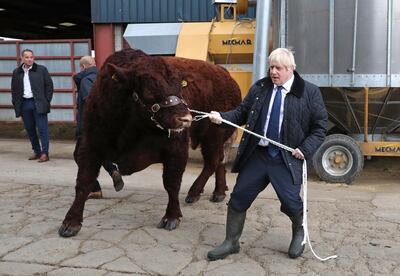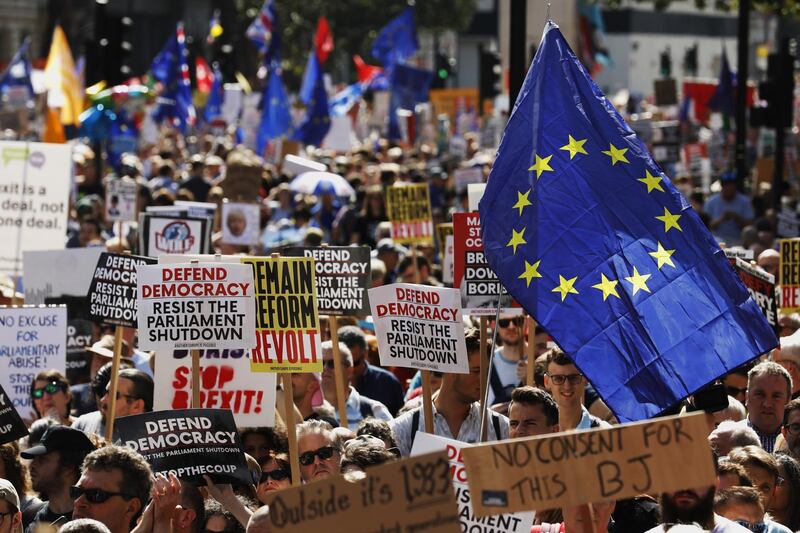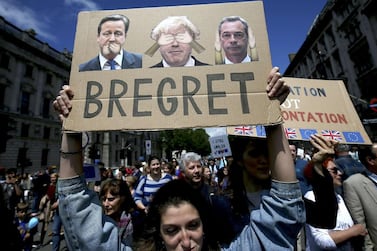Modern Britain is not a demonstrative country, in any sense of the word. As the poet Ben Jonson once put it referring to a great English house, we like things that are not “built to envious show". The British – not all of us, but most – are suspicious of people deemed “flashy".
One English literary anti-hero is Flashman. Superficially successful, he is really a liar, a cheat, a scoundrel. In recent years at least the British have tended to avoid being demonstrative in another way too – we are not much in favour of taking to the streets in protests, unlike French farmers or the gilets jaunes.
True, there were protests against Margaret Thatcher, the former British prime minister, in the poll tax riots in 1990. But the real poll tax protest was very British: instead of rioting, a million people quietly dropped off the electoral register, sacrificing their right to vote so they would not have to pay the tax. The anti-Iraq war demonstrations in 2003 brought out a million people in London, yet they were peaceful – and ineffective.
Now, as we face the possibility of the British parliament being suspended today, and MPs gather to vote on a no-deal bill, the undemonstrative British have been demonstrating in big numbers. For the demonstrators, Prime Minister Boris Johnson is a modern-day Flashman. He is in office – but not in power. In the past week he has lost from his government a key cabinet minister, Amber Rudd, and even his brother, Jo Johnson. It comes after Mr Johnson threw out of the party salt-of-the-earth Conservative MPs including former prime minister Winston Churchill's grandson, Nicholas Soames, and the former chancellor, Philip Hammond.
I have resigned from Cabinet and surrendered the Conservative Whip.
— Amber Rudd (@AmberRuddUK) September 7, 2019
I cannot stand by as good, loyal moderate Conservatives are expelled.
I have spoken to the PM and my Association Chairman to explain.
I remain committed to the One Nation values that drew me into politics. pic.twitter.com/kYmZHbLMES
I’m on my way back from one of many protests, in the great northern city of Leeds, where I shared platforms with Conservative, Labour, Green, and Liberal Democratic activists. One life-long Conservative publicly cut his party membership card in half in protest at the Conservative prime minister. Why? Because after three years of discussions, after three Conservative prime ministers, Britain has failed to leave the EU, failed to find a coherent plan for doing so, and failed to stop Brexit altogether.
Mr Johnson has had the worst start as prime minister anyone can remember. He is now commonly described in newspapers, on TV and in private conversations as someone who cannot be trusted to tell the truth. In Scotland he claimed it would be possible for the UK to sell our wonderful beef to the United States after Brexit without the Americans asking to sell their beef in Britain – a claim which met instant derision. Foreign commentators talk of the British "omnishambles". Conservative Party members wonder aloud about what happened to its reputation for competence and gradual change.
Despite his wild rhetoric – that Brexit is “do or die” and that he would rather “die in a ditch” than postpone leaving the EU – Mr Johnson, like Flashman, strikes a pose, forms a sonorous phrase, claims his own genius, and yet somehow has boxed himself into a political corner. Perhaps his only weapon now is unpredictability. Will he really refuse to obey the law if directed to move the Brexit deadline to January? I have no idea. Perhaps not even Mr Johnson himself knows. Does he really want an election when activist groups in heartland Tory country – Ludlow, Esher, Lewes, Tunbridge Wells, Guildford – are holding meetings and (very polite) demonstrations? I have no idea. Will he resign? Will we have a national unity government? I have no idea.

So let me take a stab in the dark and predict that since the Leave and Remain sides are both split, and the Conservative and Labour parties are also split, a general election will happen – but later rather than sooner, probably not before late November. The EU, I assume, will reluctantly extend the Brexit deadline, although French President Emmanuel Macron will roll his eyes and mutter about the perfidious British.
Meanwhile, the one party truly prepared to fight and win an election is the Scottish National Party, who are on course to secure around 50 or more of the 59 seats in Scotland. The Conservative Party in Scotland lost their charismatic leader Ruth Davidson, and will be more or less wiped out.
I confess that despite travelling all over Britain in the past few months, talking to politicians and activists from all parties, I could be wrong about all of this. But, stubbornly, I do think that in these febrile political times in this undemonstrative country, the one possibility that has constantly been dismissed by the leadership of both the Conservative and the Labour parties is still available to break the deadlock, a People's Vote, a campaign calling for a second referendum. Now that we know the consequences of Brexit, are we still willing to go ahead with it? I doubt it, which is why Mr Johnson has so far refused to ask the people again. But a referendum might be his – and the country's – only real salvation.
On October 19, the People's Vote campaign plans to stage the biggest demonstration seen in London in years, a million or more. Flashman, the anti-hero of the 1857 novel Tom Brown's Schooldays, is a very English rotter, but somehow he finds a way to survive.
Gavin Esler is a journalist, author and presenter






